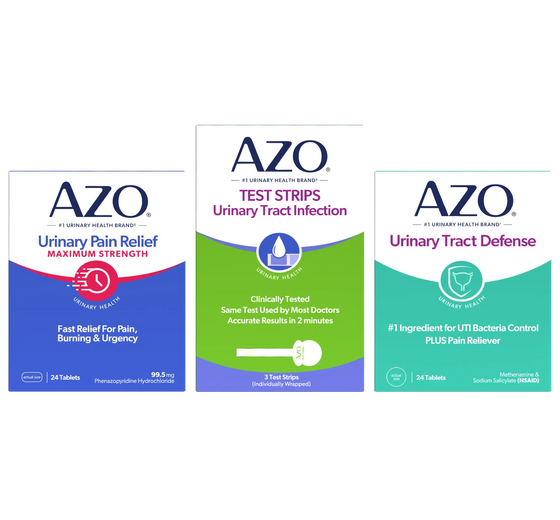
Urinary tract infections (UTIs) are really common. Did you know that 50% to 60% of women will have at least one UTI in their lifetime? For about a quarter of these women, the infections keep coming back, happening at least twice in six months or three times in a year. This makes many people wonder why some women get these infections again and again.
Understanding why UTIs return is important. Knowing more about it can help you take steps to prevent them and find relief from the symptoms. This article will explain why UTIs recur, how to prevent them, and how AZO® products can help manage the symptoms.
What Causes UTIs?
A UTI happens when bacteria, usually Escherichia coli (E. coli), enter the urinary tract and multiply. This causes symptoms like a strong need to urinate, a burning feeling when you pee, cloudy or smelly urine, and pelvic pain. In severe cases, it can cause fever and back pain if the infection reaches the kidneys.
Women are more likely to get UTIs because their urethra (the tube that carries urine out of the body) is shorter than men’s. This makes it easier for bacteria to reach the bladder. Also, the urethra is close to the anus and vagina, making it easier for bacteria to enter the urinary tract.
Why Do UTIs Come Back?
Recurrent UTIs can be a common and frustrating issue for many women. Understanding the factors contributing to this problem can help you monitor your health and develop effective prevention strategies.
- Your Body’s Makeup. Some women are more prone to UTIs. Certain genetic factors might make the urinary tract more welcoming to bacteria or make the body less effective at fighting off infections. Understanding this can help you take steps to manage your health better.
- Sexual Activity. Sex can increase the risk of UTIs because bacteria can be pushed into the urethra during intercourse. Women who often get UTIs may be more at risk. Using lubricants, peeing before and after sex, and keeping the genital area clean can help reduce this risk.
- Hormonal Changes. Changes in hormones, especially during menopause, can affect the urinary tract. Lower estrogen levels can make the lining of the urinary tract thinner and less able to fight off bacteria. Knowing this can help you seek the right treatments during different stages of life.
- Stubborn Bacteria. Some bacteria can create protective layers called biofilms, making them harder to get rid of. These biofilms allow bacteria to stick to the walls of the urinary tract and stay there even after treatment.
- Bacterial Resistance. Using antibiotics too much can make bacteria resistant to them. This makes future infections harder to treat because standard antibiotics won’t work as well.
How to Prevent UTIs
Recognizing and addressing personal risk factors is vital for managing recurrent UTIs. It is important to observe patterns and triggers linked to your infections, such as particular sexual activities, hygiene routines, or dietary habits. Maintaining a diary to log symptoms and potential triggers can help you spot trends and facilitate more informed conversations with your healthcare provider, resulting in personalized and effective care. Here are some essential strategies to help you take control of your urinary health:
- Stay Hydrated. Drinking plenty of water helps flush bacteria from your urinary tract. Aim for at least eight glasses of water a day, especially after physical activities or in hot weather.
- Eat Well. Foods rich in probiotics, like yogurt and fermented foods, can help maintain a healthy balance of bacteria. A balanced diet with lots of fruits, vegetables, and whole grains boosts your immune system.
- Practice Good Hygiene. Always wipe from front to back after using the toilet to avoid spreading bacteria. Use mild soaps and wear cotton underwear to reduce the risk of infections.
- Preventive Treatments. For women with frequent UTIs, doctors might suggest low-dose antibiotics, antibiotics after sex, or using topical estrogen for postmenopausal women. Talk to your doctor to find the best plan for you.
- Healthy Lifestyle. Regular exercise, maintaining a healthy weight, and avoiding too much caffeine and alcohol can support urinary health.
- Good Bathroom Habits. Don’t hold your urine for too long and make sure to pee after sex to help flush out any bacteria.
When to See a Doctor
If your symptoms don’t go away or worsen, see a doctor. If you have a fever, chills, or back pain, it could be a kidney infection, which is serious and needs immediate care. Blood in your urine is also a sign to see a doctor right away.
How AZO® Products Can Assist
AZO® products are designed to alleviate UTI symptoms and support urinary health.* While many rely on AZO® for UTI pain relief, if you’ve ever experienced urinary tract issues, chances are you’ve heard about the health benefits of cranberries. These products are designed to promote urinary tract cleanliness, overall well-being, and help reduce the risk of recurring UTIs. Limited scientific evidence shows that by consuming 500 mg each day of cranberry dietary supplement, may help reduce the risk of recurrent urinary tract infection (UTI) in healthy women.
- AZO® Cranberry Caplets: Combine clinically-proven cranberry powder with a probiotic and Vitamin C. These caplets feature Pacran®, a proprietary blend of whole fruit cranberry, to help flush and maintain urinary tract cleanliness.*
- AZO® Cranberry Gummies: Promote urinary health in an effective—and delicious—way. These gummies are made with clinically proven Pacran®, a super-concentrated whole fruit cranberry powder that helps cleanse the urinary tract.*
- AZO® Cranberry Softgels: Enjoy the benefits of cranberry in a fast-acting softgel. These softgels contain clinically proven Pacran® to help cleanse and protect the urinary tract.*
The AZO® UTI & Vaginal pH Test Kit is another valuable tool, helping women determine if their symptoms are related to a UTI or other vaginal infections. This kit can provide quick and accurate results, enabling women to seek appropriate treatment promptly.
Next Steps
Dealing with recurrent UTIs can be frustrating and exhausting. But remember, knowledge is power. By understanding the reasons behind these infections and taking proactive measures, you can significantly reduce their occurrence.
When it comes to your health, never hesitate to seek professional guidance. Consulting a healthcare provider is crucial, especially if you experience persistent or severe symptoms. They can offer comprehensive care and tailored treatments to address your specific needs.
For more helpful tips and information on managing and preventing UTIs, visit the AZO® Products Learning Center. Remember, your health is your priority, and you deserve to live without the burden of recurrent UTIs. Take charge of your well-being today. Consult your healthcare provider for personalized advice that suits your lifestyle.








